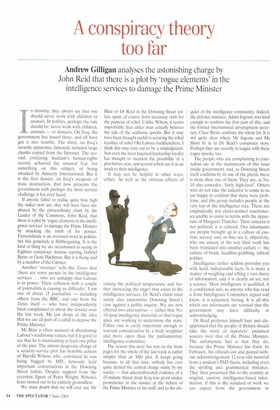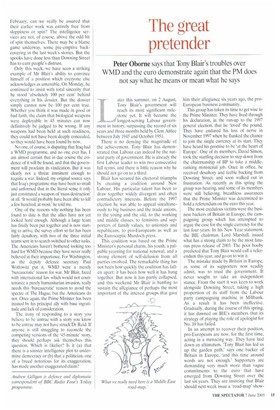A conspiracy theory too far
Andrew Gilligan analyses the astonishing charge by John Reid that there is a plot by 'rogue elements' in the intelligence services to damage the Prime Minister Tn showbiz, they always say that one should never work with children or animals. In politics, perhaps the rule should be: never work with children,
animals — or dossiers. On Iraq, the government has issued three, and all have got it into trouble. The third, on Iraq's security apparatus, famously included large chunks copied from the Internet. The second, criticising Saddam's human-rights record, achieved the unusual feat, for something on this subject, of being attacked by Amnesty International. But it is the first dossier, on Iraq's weapons of mass destruction, that now presents the government with perhaps the most serious challenge it has ever faced.
If anyone failed to realise quite how high the stakes now are, they will have been disabused by the extraordinaly claim by the Leader of the Commons, John Reid. that there is a plot by 'rogue elements in the intelligence services' to damage the Prime Minister by attacking the truth of his dossier. Extraordinary is an overused word in politics, but this genuinely is flabbergasting. It is the kind of thing we are accustomed to seeing in Eighties conspiracy dramas starring Gabriel Byrne or Gene Hackman. But it is being said by a member of the Cabinet.
Another 'minister' tells the Times that 'there are some people in the intelligence services . . . who are unhappy that Labour is in power. Their collusion with a couple of journalists is causing us difficulty.' I am one of about 15 journalists — including others from the BBC. and one from the Times itself — who have independently been complained to about the dossier over the last week. My jaw drops at the idea that we are all part of a cabal to depose the Prime Minister.
Mr Blair is often accused of abandoning Labour's traditional values, but it is good to see that he is maintaining at least one pillar of the past. The almost desperate charge of a security-service plot has horrible echoes of Harold Wilson. who, convinced he was being bugged by MI5, famously held important conversations in the Downing Street toilets. Despite support from the eccentric figure of Peter Wright, Wilson's fears turned out to be entirely groundless.
We must doubt that we will ever see Mr Blair or Dr Reid in the Downing Street toilets, apart, of course, from necessary visits for the purpose of relief. Unlike Wilson, it seems improbable that either man actually believes the tale of the seditious spooks. But it may have been thought useful in securing the tribal loyalties of rebel Old Labour backbenchers. I think this may turn out to be a misjudgment. Not even the most fanatical leadership loyalist has thought to mention the possibility of a plot before now, and several rebels see it as an insult to their intelligence.
It may not be helpful in other ways, either. As well as the obvious effects of raising the political temperature and further increasing the anger that exists in the intelligence services. Dr Reid's claim must surely also undermine Downing Street's case against a public inquiry. We are now offered two alternatives — either that No. 10 spun intelligence material, or that rogue spies are working to undermine the state. Either one is easily important enough to warrant consideration by a body weightier and more open than the parliamentary intelligence committee.
The reason this story has run on the front pages for the whole of the last week is rather simpler than an MI6 plot. It keeps going because, in all that time. nobody has ever quite denied the central charge made by my source — that uncorroborated evidence of a 45-minute threat from Iraq was given undue prominence in the dossier at the behest of the Prime Minister or his staff, and to the dis
quiet of the intelligence community. Indeed, the defence minister, Adam Ingram, was kind enough to confirm the first part of this, and the former international development secretary, Clare Short, confirms the whole lot. It is not quite clear where Mr Ingram and Ms Short fit in to Dr Reid's conspiracy story. Perhaps they are secretly in league with these rogue spooks, too.
The people who are complaining to journalists are in the mainstream of this issue inside government, and, as Downing Street itself confirms by its use of the plural, there is more than one of them. They are, as No. 10 also concedes, 'fairly high-level'. Others who do not take the initiative to come to us are happy to confirm that there were problems, and this group includes people at the very top of the intelligence tree. These are emphatically not claret-stained reactionaries unable to come to terms with the departure of Margaret Thatcher. Their concern is not political; it is cultural. Our informants are people brought up in a culture of caution, secrecy and, as they see it. objectivity, who are uneasy at the way their work has been translated into another culture — the culture of brash, headline-grabbing, tabloid politics.
Intelligence rather seldom provides you with hard, indisputable facts. It is more a matter of weighing and sifting a vast slurry of information, and it is clearly an art, not a science. Most intelligence is qualified, it is conditional and, as anyone who has read a Joint Intelligence Committee report will know, it is extremely boring. It is all this which our informants are worried that the government may have difficulty in acknowledging.
Dr Reid professes himself hurt and disappointed that the people of Britain should take the word of reporters' unnamed sources over that of the Prime Minister. The unfortunate fact is that they do, because the Prime Minister has form. In February, his officials cut and pasted without acknowledgement 12-year-old material from a student's PhD thesis, including even the spelling and grammatical mistakes. They then presented this to the country as original, current, intelligence-based information. If this is the standard of work we can expect from the government in February, can we really be assured that their earlier work was entirely free from sloppiness or spin? The intelligence ser vices are not, of course, above the odd bit of spin themselves. There may be a blame game underway, some pre-emptive backcovering in the last week's stories. But the spooks have done less than Downing Street has to earn people's distrust.
Only this week, we have seen a striking example of Mr Blair's ability to convince himself of a position which everyone else acknowledges as untenable. On Monday, he continued to insist with total sincerity that he stood 'absolutely 100 per cent' behind everything in his dossier. But the dossier simply cannot now be 100 per cent true. Whether you think it was made in good or bad faith, the claim that biological weapons were deployable in 45 minutes can now definitively be judged to be wrong. If any weapons had been held at such readiness, they could not have been deeply concealed, so they would have been found by now.
No one, of course, is disputing that Iraq had a WMD programme, and no one ever has. I am almost certain that in due course the evidence of it will be found, and that the government will proclaim its vindication. But it was clearly not a threat imminent enough to require a war. Indeed, my original source says that Iraq's programme may have been so small and unformed that in the literal sense it only just constituted a weapon of 'mass destruction' at all. 'It would probably have been able to kill a few hundred, at most,' he told me.
One of the reasons why nothing has been found to date is that the allies have not yet looked hard enough. Although a large team has finally been put together and is now starting to arrive, the survey effort so far has been fairly desultory, with two of the three initial teams sent in to search switched to other tasks. The Americans haven't bothered looking too hard for WMD because they have never really believed in their importance. For Washington, as the deputy defence secretaty Paul Wolfowitz put it. WMD were a merely 'bureaucratic' reason for war. Mr Blair, faced with international law which would not countenance a purely humanitarian invasion, really needs this 'bureaucratic' reason to avoid the spectre of The Hague, but the Americans do not. Once again, the Prime Minister has been treated by his principal ally with base ingratitude and lack of consideration.
The irony of responding to a story you believe to be untrue with a story you know to be untrue may not have struck Dr Reid, If anyone is still struggling to reconcile the competing versions of the '45-minute' story, they should perhaps ask themselves this question. Which is likelier? Is it (a) that there is a sinister intelligence plot to undermine democracy or (b) that a politician, one of a breed notorious for its exaggeration, has made another exaggerated claim?
Andrew Gilligan is defence and diplomatic correspondent of BBC Radio Four's Today programme.











































































 Previous page
Previous page